
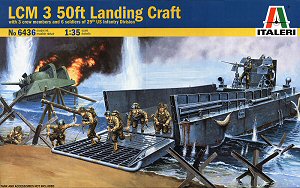
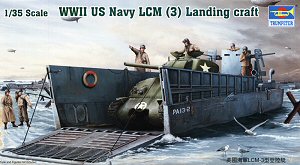
WWII US Navy LCM (3) Landing Craft
1/35 Kit Comparison
Italeri Kit No.6436 / Trumpeter Kit No. 00347
Reviews by Terry Ashley
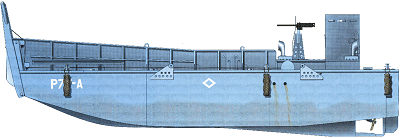




Italeri was the first to announce the kit but Trumpeter got theirs out to the shops with a couple of month’s head start and while I reviewed the Trumpeter kit (00347) back then this review will be confined to a direct comparison of the two to show the differences and for a full review of the Italeri kit I’ll refer you to Brett Green’s excellent review on Hyperscale.
As well as comparing the parts I have also checked the basic kit dimensions against the dimensions of the real LCM3 to determine the accuracy of the parts and while I don’t have 1/35th plans it is sometimes better to make your own calculations from known dimensions as there is no guarantee that a set of plans is accurate as has been shown in the past.
Each kit comes in light grey plastic as befits the nautical theme with the Italeri (IT) kit having 168 parts plus lengths of twine and a bonus Dragon figure set (#6211) while the Trumpeter (TR) kit has 161 plastic parts plus another 22 etched parts lengths of twine, plastic tube and wire as well as each having a large decal sheet for the markings.
The IT kit can only be built out of the box as a USN boat while the TR kit offers the option of building a USN or Royal Navy boat while the IT comes with three crew members as well as the inclusion of the bonus Dragon kit 6211 “U.S.
29th Infantry Division Omaha Beach D-Day 1944”.
TR has also announced the release of an LCM3 crew set for later in the year
to crew their boat.
The Lower Hull:
 Starting with the largest part in each kit, the hull is where the most
obvious difference is between the two and this has a bearing on numerous
other parts throughout the kits.
Starting with the largest part in each kit, the hull is where the most
obvious difference is between the two and this has a bearing on numerous
other parts throughout the kits.
The hull length is identical on both kits measuring out to the scale 50’ while the hull width at it’s widest is 130mm for the IT kit and 120mm for the TR kit, this difference is due to a more pronounced curve in the hull profile of the IT kit in conjunction with the hull side angle as mentioned below.
The IT hull side measures 48mm deep while the TR hull side is 59mm deep, a difference of 11mm which is quite a substantial difference as well as the IT hull side having a 3-4 degree angle while the TR hull sides are vertical.
 To try and determine which is correct we will move to the forward ramp
which has a known height of 10 foot, 2 inches in reality from the lower
hinge line, this calculates to 88.54mm in 1/35th scale.
To try and determine which is correct we will move to the forward ramp
which has a known height of 10 foot, 2 inches in reality from the lower
hinge line, this calculates to 88.54mm in 1/35th scale.
The height of the IT ramp is 88.5mm while the TR ramp is 99mm, the same
difference (give or take 0.5mm) as the hull difference and it seems this
difference has been carried over to the hull dimensions or visa versa.
It is know that there are differences on the style of crossgridding on the
upper ramp but I’m not sure if there were differences in hull design
and size during production?
The hull details vary between kits with the TR hull having nice weld seams
on the sides while these on the IT kit are simply very fine raised lines
and will need some enhancement. On the stern underside the IT kit has substantial
weld seams around the rudder/fin and screw mountings while there are none
on the TR kit.
The screws on the IT kit have three blades and a noticeable curve with the
screws on the TR kit have four blades and are rather flat, also the IT kit
includes the V supports for the rudder assembly which isn’t on the
TR kit.
The only photos I have of the rear hull undersides are from the Allied & Axis Dragon Wagon book which show the screws and rudder assembly as depicted
in the IT kit.
On the rear hull is a separate bolted round inspection hatch that is not
included in the TR kit.
The forward ramp on both kits has a separate front section with bow projection which has a sharp profile on the TR part and a more rounded profile on the IT kit and most photos I’ve seen have the IT kit configuration, also the IT bow has weld seams depicted around the projection while there are none on the TR bow.
The ramp hinge is in multiple parts that can be assembled movable in the TR kit while the IT kit has simplified hinges but this too is movable after assembly once the floor is in place. Another point is with the ramp winch, this is only positioned on the port side as depicted in the IT kit but TR include the winch on both sides something not indicated in most photos.
The Upper Hull:
 The upper section of the well deck wall forms the upper hull sides and has
additional ‘lattice’ supports added on the outside, these
are fairly basic on the IT kit while are more detailed on the TR kit but
again the dimensional differences are seen here with the height (at highest
point) is 31mm on the TR kit and 26mm on the IT kit. There are also some
prominent pin marks on the IT parts that will need filling before any
assembly is done.
The upper section of the well deck wall forms the upper hull sides and has
additional ‘lattice’ supports added on the outside, these
are fairly basic on the IT kit while are more detailed on the TR kit but
again the dimensional differences are seen here with the height (at highest
point) is 31mm on the TR kit and 26mm on the IT kit. There are also some
prominent pin marks on the IT parts that will need filling before any
assembly is done.
The ramp pulley assemblies on the upper front hull sides are also noticeable
larger in the TR kit which are made up of five parts with movable pulleys
while the IT assemble is a single part of different design than that on
the TR kit.
The difference in size of the pulley assemblies is probable again due to
the hull height differences while most photos seem to show the design of
the TR assembly is more common although with some additional small support
brackets added. The single piece IT pulley part does have nice weld seams
on the side rib join while there are none on the TR part but the simplified
parts lacks some detail definition.
The four large lifting ‘eyes’ on the hull sides are provided in etched metal in the TR kit while they are in plastic with the IT kit and the detail on the etched parts is more finely rendered.
The Well Deck:
 The well deck floor is the same length in both kits but is 9mm different
in width at the narrowest as well as the details such as the inspection
plates and ribbing being different on both but without any photos of this
area I can’t say which is the more accurate?
The well deck floor is the same length in both kits but is 9mm different
in width at the narrowest as well as the details such as the inspection
plates and ribbing being different on both but without any photos of this
area I can’t say which is the more accurate?
The well deck sides are also different in height again due to the hull
height with the rear wall having a known height of 6 foot 4 inches which
calculates to 55.154mm in 1/35th scale. The IT kit at this point
measures 55.2mm and the TR kit 61.5mm.
The weld seam details on the TR kit walls are nicely represented while there
are no weld seams on the IT walls.
On the IT floor are four tie-down brackets that are not on the TR kit as
well as two very delicate grapple hooks located on the starboard well wall
which again are not included in the TR kit.
The rear well bulkhead has a choice of USN or RN ladder configuration in
the TR kit with as mentioned just the USN ladder in the IT kit.
The Upper Deck:
 Both upper decks have well represented tread plate pattern although of slightly
different design on each with the weld seams on the rear deck included
on the TR kit but are just engraved lines on the IT. (I am assuming these
are weld seams and not removable panels?).
Both upper decks have well represented tread plate pattern although of slightly
different design on each with the weld seams on the rear deck included
on the TR kit but are just engraved lines on the IT. (I am assuming these
are weld seams and not removable panels?).
Both have the raised poop deck with the TR kit having the deck panel completely as a separate part while the IT kit has the rear section included with the main deck section with just the forward poop deck separate.
The minor details on the deck are engineered differently on both kits but the end result is similar with both also having the engine inspection door as a separate part.
The Wheel House:
 The four walls of the wheel house are separate parts on each kit but the
panels in the TR kit are 4mm higher than those in the IT kit and there
is also a raised “floor” on the TR kit. The IT walls have
bolt head detail around the bottom of each panel which is not on the TR parts and the entry door has more rounded corners on the IT kit which
is more in keeping with navel doors.
The four walls of the wheel house are separate parts on each kit but the
panels in the TR kit are 4mm higher than those in the IT kit and there
is also a raised “floor” on the TR kit. The IT walls have
bolt head detail around the bottom of each panel which is not on the TR parts and the entry door has more rounded corners on the IT kit which
is more in keeping with navel doors.
The instrument panel consol is a single moulding with decals for the instruments in the IT kit while it is four parts with engraved dials in the TR kit and the wheel in the IT kit is considerably finer than that in the TR kit.
.50 cal Machine Gun Mounts:
 The pedestal mounts for the two .50cal machine guns are supplied in etched
metal with the TR kit and plastic in the IT kit and while the plastic
mountings would be considered quite okay under normal circumstances they
are eclipsed by the well defined etched mountings in the TR kit.
The pedestal mounts for the two .50cal machine guns are supplied in etched
metal with the TR kit and plastic in the IT kit and while the plastic
mountings would be considered quite okay under normal circumstances they
are eclipsed by the well defined etched mountings in the TR kit.
The .50cal machine guns in the TR kit are some of the best renditions
of the weapon we have seen and are simply superb while the .50cal in the IT kit
is the same basic weapon seen in many IT kits and pales in comparison
even given the fact the guns in the TR kit are the aircraft type
and the
IT kit has the vehicle type. The gun shields are again supplied as
etched parts in the TR kit and are clearly better defined than the
plastic shields in the IT kit, but again that is not to say the IT shields
are poor, they are actually moulded quite thin with good shape but it is
just the etched
parts are better. But having said that, it should be noted that the TR etched
shields are slightly narrower than the IT plastic ones and given
the other dimension discrepancies in the TR kit are they the right size?
Extras:
 The TR kits has a couple of beach obstacles included while the IT kit has
additional equipment such as a couple of 44 gallon barrels and addition
bumper tyres to use as required as well as a large stand to sit the boat
on for display if it is not being included in a diorama setting.
The TR kits has a couple of beach obstacles included while the IT kit has
additional equipment such as a couple of 44 gallon barrels and addition
bumper tyres to use as required as well as a large stand to sit the boat
on for display if it is not being included in a diorama setting.
Other details such as the rope bumpers and buoy floats have different details
in each kit but are both perfectly adequate.
The addition of the crew figures and Dragon 29th Infantry Division figures
is a nice bonus and will be very useful for dioramas.
Decals:
Both kits have fairly large decals sheets with the TR kit having fairly
generic markings with a series of numbers and while basically for the
Normandy landings could be used for any boat. The IT decal sheet has markings
for two specific boats, one from the Normandy landings and the other from
Iwo Jima in 1944 as well as series of generic numbers to depict any boat.
There is also an American flag as well as the large name decal for the
model stand and as mentioned the instrument dials.
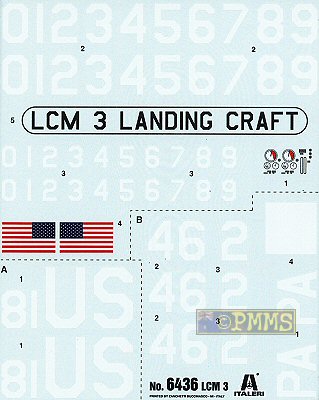
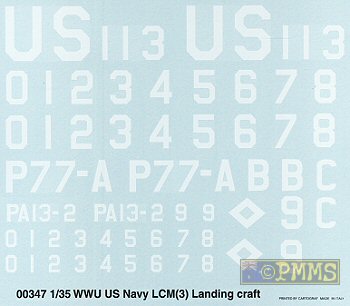
Conclusion:
Clearly based on available information the IT hull is far more accurate dimensionally
and this discrepancy with the TR kit carries through to other areas of the
kit where additional compensations had to be made to accommodate the discrepancies.
On the reverse side the .50cal machine guns and pedestal mounts are a standout feature of the TR kit with the IT kits getting bonus points for the inclusion of the figures.
Other detail pluses and minuses are spread evenly with weld seams in some places on one kit but not on the other and visa versa as well as things like the workable hinges on the ramp on the TR kits and the much better defined pilot wheel on the IT kit but overall the points would have to go to the IT kit due to the more accurate dimensions.
For the ultimate LCM3 it would be to combine the Italeri kit with some of the details such as the .50cal Machine Guns, mounts and other etched parts from the Trumpeter kit.
The Sprues:








References:
| WWII US Landing Craft in action #4017 Squadron Signal Publications ISBN 0-89747-451-1 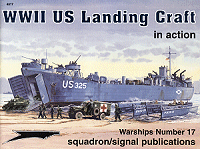 |
Dragon Wagon A Visual History of the US Army's Heavy Tank Transporter 1941-1955 Ampersand Publishing 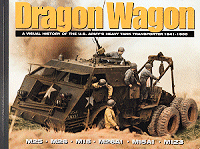 |
| TMMI Issue 102 LCM(3) Diorama 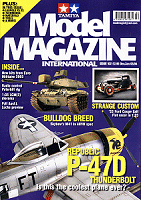 |
Page created 11 September 2004
Updated 12 September 2004